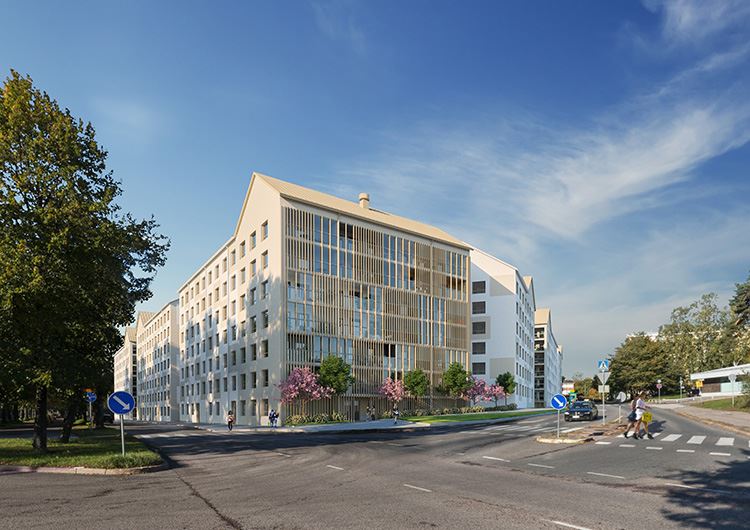Sustainable data centers as a service
We are launching a residential apartment building project in Koskela, Helsinki. The project will be one of the largest tender-based residential construction contracts in Finland. What is it like to start a construction site in these coronavirus times? How does it differ from normal?
We are building a large project for the Housing Production Bureau of the City of Helsinki (ATT). The project is one of the largest residential construction contracts in Finland, including 365 apartments and an underground parking facility for almost 200 cars that will be built under the yard deck on two levels. The apartments are Hitas, right-of-occupancy, rental and special apartments.
The area around Koskela hospital in Helsinki is being renewed as a whole. The hospital will continue to operate in the protected hospital building, but we are constructing seven new buildings that will comprise three housing companies.
The project has exceptionally demanding establishment and foundation conditions that require special competence. The foundation will be located 10 metres underground, under groundwater. The sheeting and piling volume is massive; for example, the quantity of bored piling in the area is approximately 30,000 running metres.
The site has a visible and busy location along Koskelantie near Lahdentie. It is surrounded by round-the-clock hospital housing and other housing. There are several occupational safety matters that have to be taken into account. For example, a retirement home and several daycare centres operate in the area during the project, which means that moving in the area and the access of emergency vehicles must be ensured at all times. The plot is compact and there will be lots of heavy traffic, which means we must pay particular attention to the environment.
Construction will begin in April 2020, and the estimated completion is in the summer 2023.
The Koskela construction site is about to begin work. We have a proactive approach to our cooperation and communication with clients and other stakeholders, and the aim is to minimise mistakes through carefully managed measures. Technical contract matters must be reconciled with the safety of people so that neither is compromised.
“In practice, these measures include having separate dressing rooms and washrooms for smaller groups of employees,” Juuso Rapeli, Construction Manager at YIT says.
”For example, on one of our existing sites, we divided the large dressing room and washroom facility into smaller units with partition walls. The aim of this measure is to limit the number of people exposed to the virus in the case of an infection.”
Rapeli points out that the fire and rescue requirements of divided rooms must not be forgotten. Each room must have rescue access in the case of an emergency situation.
Due to the present situation, a number of white collar employees work from home, which reduces the number of physical contacts. Key employees, such as Site Managers, have appointed deputies who have been approved by the clients and the building control team, so that if they fall ill, work can continue without delay.
Good hygiene and hand washing are essential to prevent infections. In addition to washing facilities, everyone has access to hand sanitisers, and we are paying particular attention to cleaning. Surfaces that are touched often, such as handles and tables, must be kept clean. Workspaces in Koskela will be cleaned once a day, or more often if needed.
The exceptional regulations and measures are discussed at the 15-minute occupational safety briefings. In Koskela, the regulations and measures resulting from the coronavirus are also included in the site induction, which must be completed by everyone working on the site.
According to Rapeli, the information is shared with everyone—including the employees of subcontractors—in several languages and illustrated. The workers come from different countries, and their native languages and linguistic skills vary. There might also be differences in operating cultures, and these must be taken into consideration. For example, hugging, shaking hands or other physical forms of greeting might be more common in some cultures.
In Rapeli’s view, remote work among white collar employees has also affected meeting culture, and some of the changes are positive.
“Remote meetings are more time-effective because we tend to stick to the agenda better when we discuss matters remotely. There is no general chatting and negotiations in small groups, which means we must prepare for the meeting in advance.”
“We act as one YIT team, which includes several subcontractors and other operators. The key is to involve everyone so that they follow the instructions. We must use various involvement and leadership methods on the sites to ensure that, for example, everyone washes their hands properly,” Juuso Rapeli says.
“YIT’s values are highlighted in the current situation – they are not empty phrases but actually guide our work. These measures help us protect both customers and personnel, and we can only succeed through cooperation and mutual respect. No-one can prevent the spread of the virus alone, this must be a joint effort. Work and working methods will inevitably change, which requires creativity and flexibility from everyone. For example, staggered lunch and coffee breaks mean learning a new routine at the site. Welcoming change and new ideas makes this easier for everyone.”
“We are passionate about our work. We do our best to ensure that we can continue to do our bit for as long as possible.”
You also might be interested in
